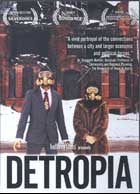
Detropia 2012
Distributed by Bullfrog Films, PO Box 149, Oley, PA 19547; 800-543-FROG (3764)
Produced by Heidi Ewing & Rachel Grady
Directed by Heidi Ewing & Rachel Grady
DVD, color, 86 & 58 min.
General Adult
African Americans, Capitalism, Economics, Geography, Globalization, Industries, Labor Relations, Urban Areas, Urban and Regional Planning
Date Entered: 06/17/2013
Reviewed by Linda Frederiksen, Washington State University, Vancouver, WAIn the space of less than 100 years, the city of Detroit, Michigan, has gone from the fastest growing city in United States to a modern ghost town. The failure of the American automobile manufacturing industry, and the subsequent loss of millions of jobs that supported it, impacted Detroit more dramatically than anywhere else.
Throughout much of the 20th century, people flocked to Detroit for good jobs in the auto industry. At mid-century, the population of Detroit stood at nearly 2 million people. Within the past 10 years, however, that number dropped to less than 700,000 inhabitants. With no way to earn a living, residents were forced to abandon the city in droves, leaving behind homes and businesses and a tax base that can no longer support basic services. For those that stayed, life in this once great city is defined more by decay than growth.
Three Detroiters who stayed serve as the film’s narrators, speaking poignantly about their city and its problems. A nightclub owner, a young video blogger, and a local union president tell and show the story of Detroit’s decline as they each move around the city. Although there is some degree of optimism that a city that has hit rock bottom will find a way to turn itself around, the narrators also caution viewers that what happened to Detroit should be a wake-up call to the rest of country. In the new economy, neither industries nor cities are too big to fail.
Filmmakers Ewing, who grew up near Detroit, and Grady are also known for their work on Jesus Camp and The Boys of Baraka. They tell this sad story, that include issues of race and class as much as economics, with cinematic beauty and grace. Bonus features include deleted scenes and interviews. The film was nominated for the Grand Jury Prize and won for best editing at the Sundance Film Festival in 2012.